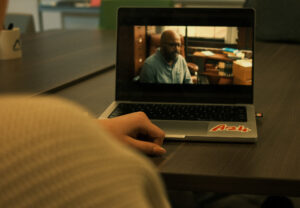On April 5. HBO Max released a documentary detailing the extraordinary life of professional skateboarder Tony Hawk. Running 2 hours and 15 minutes, director Sam Jones captures the crucial points of Hawk’s upbringing that made him into the skating legend he is today.
Hawk created 100 tricks and landed hundreds of McTwists along with a pivotal 900 land that skyrocketed his career. However, his popularity was not well received in the skating community. The film shows effortless skating juxtaposed with full force lands on the deck which lets the viewer know that Hawk’s just a regular dude who happens to be one of the greatest skateboarders to ever live.
Hawk first picked up a board at 12 years old. He joined the skating group, The Bones Brigade, that was managed by fellow skating icon Stacy Peralta. Hawk considered himself a professional by the age of 14.To the skating community, he was just a stubborn, annoying child who wanted to fit in with the cool kids. It did not help his case that his father helped organize the National Skateboarding Association. Hawk won his competitions with stunning routines but his peers often claimed nepotism for his first place finishes. Nevertheless, his love for the sport allowed him to ignore his critics and focus on being the best in the skating community, beating out prominent competitors such as Christian Hosoi and Duane Peters.
It seems that a camera has never left Hawk’s side throughout his career. Jones used what felt like endless amounts of vintage footage and photographs to document the progress of Hawk’s career. Even footage from the early ‘90s was used, when skateboarding fell into a sharp decline and excavators are shown tearing up local skate parks in California. But the most shocking footage used was the 1999 X-Games, where after ten failed attempts, Hawk was the first to land a 900 on a vertical ramp. We actually get to see a professional athlete genuinely struggling, which has become rare in the media. We can feel the suspense growing as Hawk’s frustration turns to triumph as he sticks the trick. This crucial scene is played without music, adding to the tension and immersive experience. We hear the interviewers at the X-Games commenting on the event as it goes on, but there is no music to accompany it. “It is a powerful scene that shows raw emotion and immerses the viewer.”
The documentary puts a unique perspective on the skateboarding icon. He could have been no one if skateboarding failed to become popular again. What the documentary shows is that he has the most dedication and determination out of the entire skateboarding community, allowing him to be who he is. It’s a smart piece of editing alongside credible interviews of fellow professional skateboarders that lets the public get a closer view into the hardships this sport faces and the man who revolutionized it.











